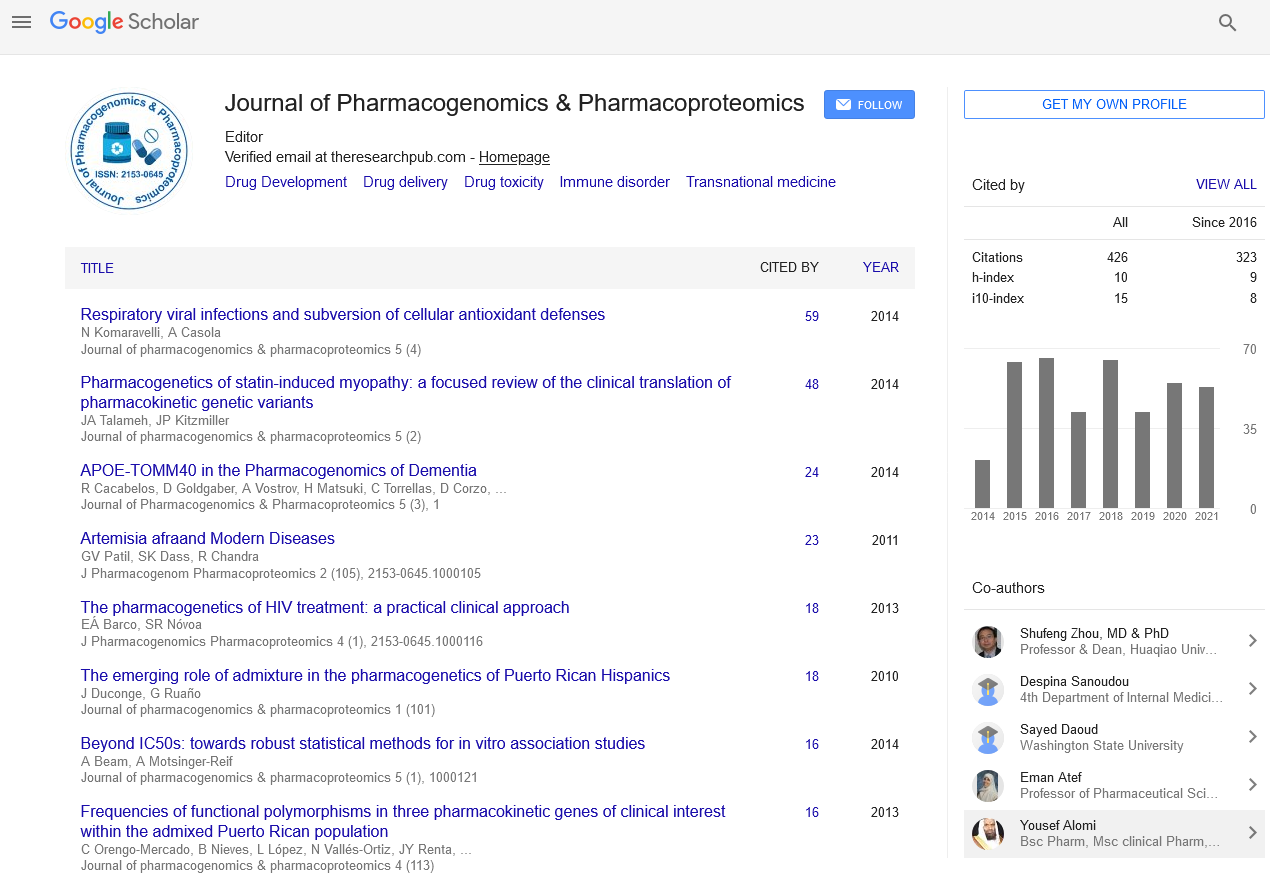Indexed In
- Open J Gate
- Genamics JournalSeek
- Academic Keys
- JournalTOCs
- ResearchBible
- Electronic Journals Library
- RefSeek
- Hamdard University
- EBSCO A-Z
- OCLC- WorldCat
- Proquest Summons
- SWB online catalog
- Virtual Library of Biology (vifabio)
- Publons
- MIAR
- Euro Pub
- Google Scholar
Useful Links
Share This Page
Journal Flyer

Open Access Journals
- Agri and Aquaculture
- Biochemistry
- Bioinformatics & Systems Biology
- Business & Management
- Chemistry
- Clinical Sciences
- Engineering
- Food & Nutrition
- General Science
- Genetics & Molecular Biology
- Immunology & Microbiology
- Medical Sciences
- Neuroscience & Psychology
- Nursing & Health Care
- Pharmaceutical Sciences
Pharmacogenetics of Alzheimers disease: The critical role of the APOE-TOMM40 region
5th International Conference on Predictive, Preventive and Personalized Medicine & Molecular Diagnostics
December 01-02, 2016 Valencia, Spain
Ramon Cacabelos
EuroEspes Biomedical Research Center, Spain
Keynote: J Pharmacogenomics Pharmacoproteomics
Abstract:
Anti-dementia drugs are not cost effective and less than 20% of the patients respond to conventional drugs. Pharmacogenetics accounts for 60-90% variability in pharmacokinetics and pharmacodynamics. The genes involved in the pharmacogenomic response to drugs in Alzheimer�??s disease (AD) fall into five major categories: Pathogenic genes; mechanistic genes; metabolic genes; transporter genes and pleiotropic genes. Among pathogenic genes, APOE (19q13.2) is the most prevalent gene as a risk factor for AD, especially the APOE-4 allele. Adjacent to the APOE gene is the TOMM40 locus. A poly T repeat in an intronic polymorphism (rs10524523; intron 6) in the TOMM40 gene, which encodes an outer mitochondrial membrane translocase involved in the transport of Aβ and other proteins into mitochondria has been implicated in AD and APOE-TOMM40 genotypes have been shown to modify disease risk and age at onset of symptoms. Taking the APOE-TOMM40 region as reference locus, pharmacogenetics studies have revealed the following: APOE-4 carriers are the worst responders and APOE-3 carriers are the best responders to conventional treatments. TOMM40 poly T-S/S carriers are the best responders, VL/VL and S/VL carriers are intermediate responders and L/L carriers are the worst responders to treatment. Patients harboring a large (L) number of poly T repeats in intron 6 of the TOMM40 gene (L/L or S/L genotypes) in haplotypes associated with APOE-4 are the worst responders to treatment. Patients with short (S) TOMM40 poly T variants (S/S genotype) and to a lesser extent S/VL and VL/VL carriers in haplotypes with APOE-3 are the best responders to treatment. In 100% of the cases, the L/L genotype is exclusively associated with the APOE-4/4 genotype and this haplotype (4/4-L/L) is probably responsible for early onset of the disease, a faster cognitive decline and a poor response to different treatments.
Biography :
Ramon Cacabelos is a Professor and Chairman of Genomic Medicine at Camilo Jose Cela University, Madrid and President of the EuroEspes Biomedical Research Center, Institute of Medical Science and Genomic Medicine, Corunna, Spain. He has received his MD from Oviedo University, PhD from Santiago de Compostela University and DMSci (Psychiatry) from Osaka University Medical School, Japan. After a decade at the Department of Psychiatry in Osaka, he returned to Spain and focused his research activity on the genomics and pharmacogenomics of Alzheimer’s disease, neurodegenerative disorders and neuropsychiatric pathology. He has published over 600 papers, 400 chapters and 24 books. One of his major contributions is the first World Guide for Drug Use and Pharmacogenomics (2012). He is also an Editor-in-Chief and Member of the Editorial Board of several international journals, Member of over 30 scientific societies and President of the Spanish Society of Genomic Medicine and the World Association of Genomic Medicine.
Email: rcacabelos@euroespes.com


